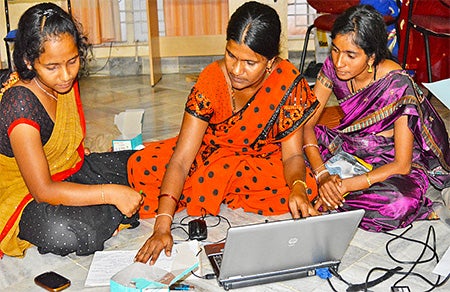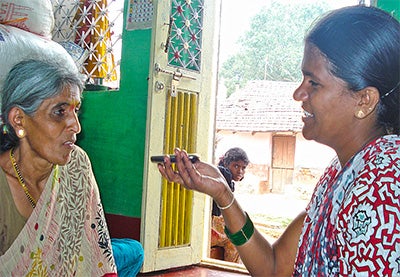Soumya's Blog

Every woman ‘should rise up to the challenges that surround her, and break free’
Dated: 5 April 2016
As an “infomediary,” Soumya uses digital and offline sources to collect the latest information about governmental services that may be useful for women who are socially and economically marginalized. Each month, she visits remote villages of Mysuru to share that information and helps visitors to the centre file applications for entitlements such as welfare payments and subsidies. She also works with IT for Change team members in using community video and mobile phones to enhance communication among women's collectives located in different villages.

With help from Anupama Suresh from IT for Change, Soumya wrote this account of her life journey, to show other young women in difficult situations that they can empower themselves.
“Today, when I go to the villages, I am recognized for the work that I do – by the destitute elderly whose pension applications I have filled; by the women's collectives to whom I have explained how to demand their monthly food rations from the fair price shop in their village; and by the students whom I have advised about vocational training and job opportunities in the government and NGO sectors. My work fills me with joy, and my ambition is to work towards enabling women and children around me to access the right opportunities to lead a life of their choice. My personal experience made me determined that no woman around me should ever feel low and defeated. Instead, she should be able to rise up to the challenges that surround her, and break free.
“When I was 19, my parent forcibly married me off to a relative. My parents are marginal farmers, and they were worried that if they delayed my marriage, they may not find another bridegroom. They gifted my husband some money to help him buy a jeep and start work as a driver. Three months after marriage, I became pregnant and gave up my studies. I was studying for a B.A. in Kannada [the local language] literature, and I had dreams of finding a good job that would help me become financially independent. All seemed well, until I went to my mother’s house for the delivery. I had a daughter and this was a momentous occasion for me, and I was expecting my husband to come visit us. He did not show up. A few days later, my in-laws came. It turned out that he had started drinking and gambling and had sold the jeep to pay his debts. I went back but he turned abusive and his drinking worsened. I went back to my parents’.
“My mother was in a women's collective that was associated with the information centres initiative, and when this job opened up, her friends informed us about it. Since there was a lot of financial pressure, and I could not completely depend on the charity of my parents or in-laws, I took the job. I learned a lot from the training – not just about computers and technology, but also about bravely facing officials and interacting and speaking up in public meetings.

“After working for a few months, I tried to start my life again with my husband. I sent him for addiction counselling. I helped him buy another vehicle to replace the one he had sold. But he lapsed back into his old ways – twice! -- despite my repeated pleas. Finally, it seemed very clear to me that my husband was not going to change at all, or make any effort to do so. I made the really hard decision to move out of his house and go live with my widowed sister. Today, she and I continue to stay together, and she looks after my daughter when I am at work. My daughter is in primary school. I want her to be an independent woman when she grows up. I want her to study as much as she can!
There is constant pressure from my family for me to reconcile with my husband. Resisting that is an ongoing struggle. It has been hard, but I gain strength when I see other women in similar situations. And I know that my position enables me to reach out to them and extend a supporting hand.”
Soumya is from a rural area of Mysuru district of Karnataka state in southern India. For six years, she has worked with the information centres initiative of IT for Change, an NGO. These kiosks, owned and managed by women's collectives, use Internet and mobile phone networking to disseminate information that local communities can use to demand their rights and entitlements from local government. Between 2012-14, these centres were supported by the UN Women Fund for Gender Equality.